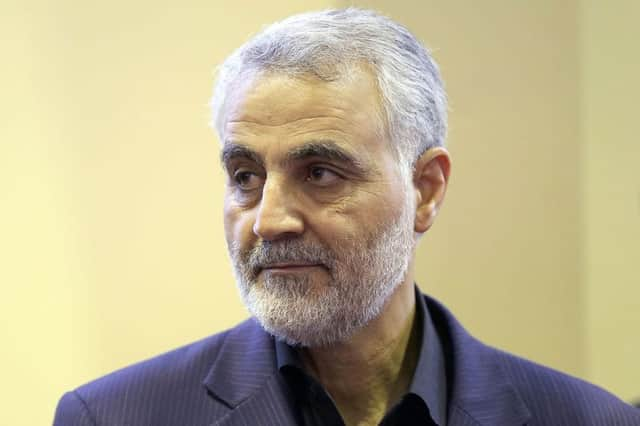Who was Qasem Soleimani, why did the US target him and how will Iran respond?


US President Donald Trump ordered a fatal US airstrike on Major General Qasem Soleimani, the head of Iran's paramilitary forces, early this morning.
The killing of Soleimani marks a significant escalation in tensions between Iran and the US.
Advertisement
Hide AdAdvertisement
Hide AdBut why did President Trump target Soleimani? How significant is his death? And could this action lead to increased tensions and even war between the two nations?
Who was Qasem Soleimani?
Soleimani was considered one of Iran's most powerful figures. He was the architect of military and intelligence operations overseas as the commander of Iran's Quds Force of the Revolutionary Guards.
Aged 62 at the time of his death, Soleimani is understood to have reported directly to Iran's Supreme Leader Ali Khamenei. In recent years, he has been responsible for spearheading Iran's growing military influence in the Middle East.
The US suspects that Soleimani was responsible for attacks on American forces in the region for the past couple of decades.
Advertisement
Hide AdAdvertisement
Hide AdThe Revolutionary Guards were designated as a foreign terrorist organisation by the US last year.
Why did the US target Soleimani specifically?
For a long time, the White House has seen Soleimani as a threat to US interests. As a powerful military figure in Iran, he was a fairly obvious target.
He was killed in Baghdad this morning by a US drone strike.
A statement released by the Pentagon this morning has claimed that General Soleimani was "actively developing plans to attack American diplomats and service members in Iraq and throughout the region" and that the strike was "aimed at deterring future Iranian attack plans".
General Soleimani was actively developing plans to attack American diplomats and service members in Iraq and throughout the region. https://t.co/Me5DMvMgSp
— The White House (@WhiteHouse) January 3, 2020
What's happened in the aftermath of the attack?
Advertisement
Hide AdAdvertisement
Hide AdThe US has urged any American citizens currently in Iraq to depart immediately, indicating fears that Americans could now be at serious risk in the country.
#Iraq: Due to heightened tensions in Iraq and the region, we urge U.S. citizens to depart Iraq immediately. Due to Iranian-backed militia attacks at the U.S. Embassy compound, all consular operations are suspended. U.S. citizens should not approach the Embassy. pic.twitter.com/rdRce3Qr4a
— Travel - State Dept (@TravelGov) January 3, 2020
The Israeli Prime Minister Benjamin Netanyahu has reportedly cut short a visit to Greece in the wake of the attack.
750 airborne troops have immediately been deployed to Kuwait by the US for use as a rapid reaction force in Iraq. Officials have commented that up to 3,000 could be sent over the coming days.
How will Iran respond to the attack?
Advertisement
Hide AdAdvertisement
Hide AdIt is not yet clear exactly how Iran will respond to this latest attack. However, Iran's Supreme Leader Ali Khamenei has issued a statement saying that while Soleimani's death was "bitter", "the final victory will make life more bitter for the murderers and criminals".
Iran's Defence Minister Brig. Gen. Amir Hatami has claimed that the attack will be met with a "crushing" response, while Foreign Minister Javad Zarif named the strike an "act of international terrorism".
Representatives from several countries around the world have called for a de-escalation of tensions between Iran and the US.
Does Iran have nuclear weapons - and could they use them in retaliation?
In 2015, Iran agreed to a deal on its nuclear programme which would limit its sensitive nuclear activity and allow international inspectors to check on their nuclear activity in return for the lifting of economic sanctions on the country.
Advertisement
Hide AdAdvertisement
Hide AdThe deal came after years of anxiety around Iran's alleged efforts to develop a nuclear weapon.
However in May 2019, Iran suspended its commitments to the deal a year after the US also withdrew their commitments.
Iran has since announced it would increase its stockpile of uranium, indicating a potential move towards building a nuclear weapon.
As it currently stands, the country is not known to possess a fully operational nuclear weapon, so could not carry out an attack.
What is the UK's response?
Advertisement
Hide AdAdvertisement
Hide AdThe UK's foreign office has issued a statement on the death of Soleimani.
“We have always recognised the aggressive threat posed by the Iranian Quds force led by Qasem Soleimani," said Foreign Secretary Dominic Raab.
"Following his death, we urge all parties to de-escalate. Further conflict is in none of our interests.”
Sky News have reported that the UK military had increased its "security and readiness" in the region, but both the foreign office and Ministry of Defence have yet to confirm this.
Originally published on our sister title, The Scotsman